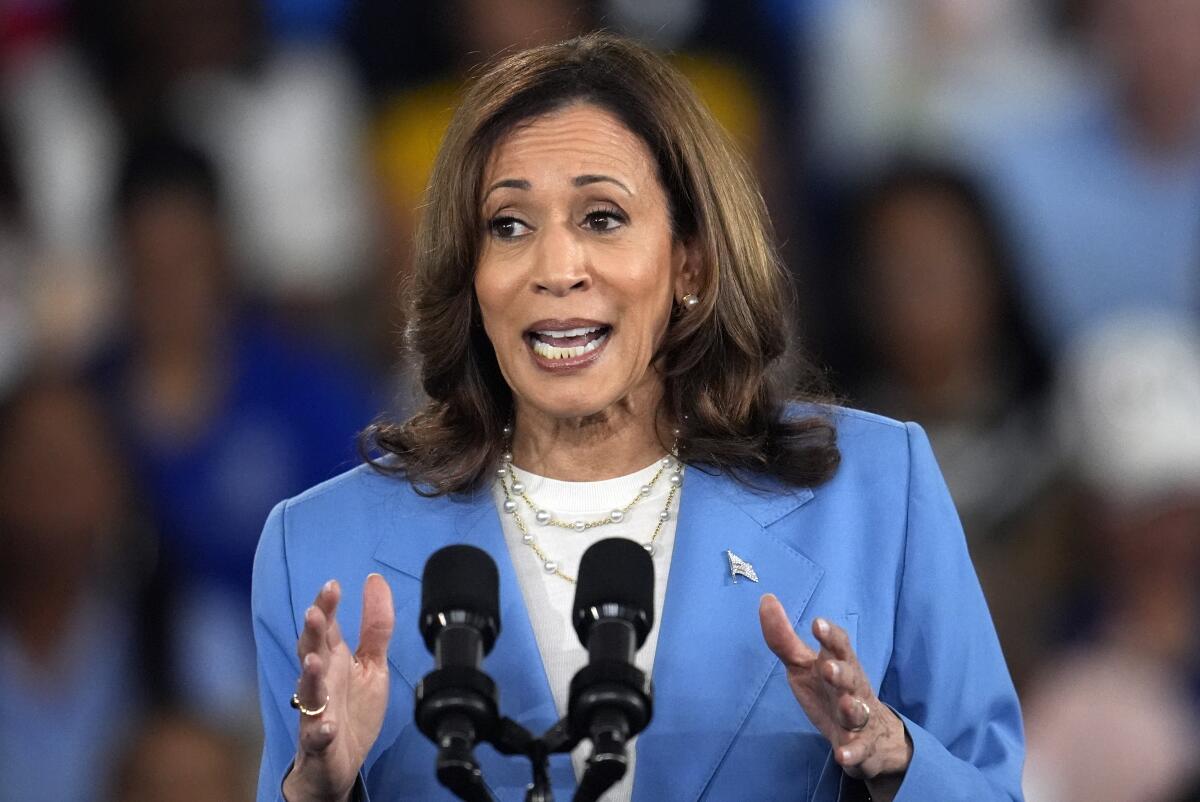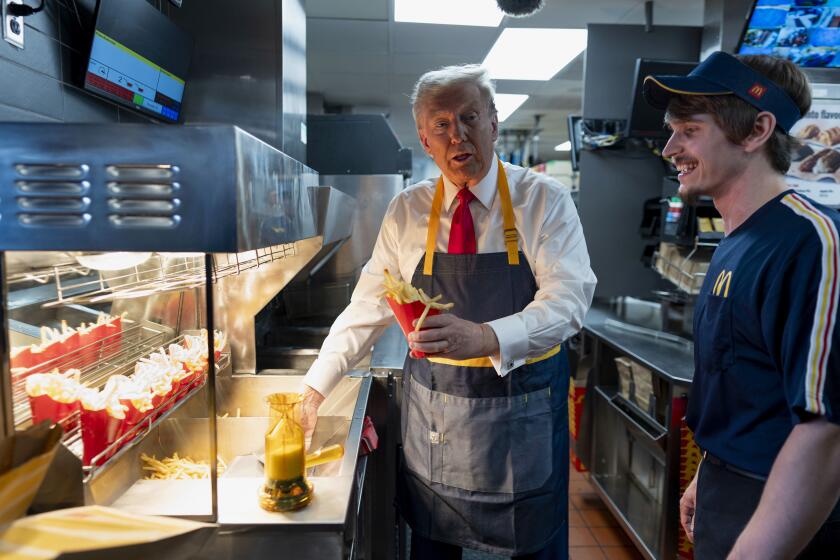Harris offers proposals to cut food and housing costs, trying to blunt Trump’s economic attacks

- Share via
RALEIGH, N.C. — Vice President Kamala Harris announced a sweeping set of economic proposals on Friday meant to cut taxes and lower the cost of groceries, housing and other essentials for many Americans.
“Look, the bills add up,” she declared, trying to address the financial concerns that are at the top of many voters’ minds and that Republican Donald Trump is attempting to blame on her.
During a speech in the battleground state of North Carolina, Harris said that “building up the middle class will be a defining goal of my presidency” as she promoted her plan for a federal ban on price-gouging by food producers and grocers. She also proposed $25,000 in down payment assistance for certain first-time home buyers and tax incentives for builders of starter homes.
“Every day across our nation, families talk about their plans for the future, their ambitions, their aspirations for themselves, for their children. And they talk about how they’re going to be able to actually achieve them financially, because, look, the bills add up,” Harris said. “Food, rent, gas, back-to-school clothes, prescription medications. After all that, for many families, there’s not much left at the end of the month.”
She emphasized tax breaks for families, as well as middle- and lower-income people, promising to expand the child tax credit to up to $3,600 — and $6,000 for children in their first year of life.
The vice president also wants to enlarge the earned income tax credit to cover people in lower-income jobs without children — which the campaign estimates would cut their effective tax rate by $1,500 — and lower health insurance premiums through the Affordable Care Act.
Harris isn’t looking for any radical departures from President Biden, who stepped down from the race last month and endorsed her. Still, the vice president has embraced a dash of economic populism, shifting away from Biden’s emphasis on job creation and infrastructure to matters more closely tied to easing the cost of living — food prices, housing costs and tax breaks for families.
Much of what she’s proposing would require congressional approval, which is far from assured in the current political environment, though, and Harris’ campaign has offered scant details on how to pay for the ideas.
The vice president is seeking to blunt Trump’s attacks on her as “a radical California liberal who broke the economy,” as he put it in a speech Thursday, during which he displayed popular grocery items meant to illustrate the high cost of food.
Donald Trump has recently adopted an old playbook for getting attention: Standing in front of the media to talk smack, tell lies and generate headlines.
Some of Trump’s economic advisors offered further rebuttals to Harris’ plans before she spoke Friday, with Brian Hughes, a spokesman for the former president’s campaign, calling them representative of a “socialist and authoritarian model.”
Kevin Hassett, a former chairman of the Council of Economic Advisers during the Trump administration, called it “completely preposterous” for the government to play a role in setting food prices, a reference to Harris’ proposed federal ban on “corporate price-gouging” on food.
In her speech, Harris offered stark contrasts with Trump’s economic proposals, including his call for steep tariffs on foreign goods. She said that her opponent “wants to impose what is, in effect, a national sales tax on everyday products and basic necessities that we import from other countries.”
“It will mean higher prices on just about every one of your daily needs,” Harris said. “A Trump tax on gas, a Trump tax on food, a Trump tax on clothing, a Trump tax on over-the-counter medication.”
Year-over-year inflation has reached its lowest level in more than three years, but food prices are still 21% above where they were three years ago. A Labor Department report this week showed that nearly all of July’s inflation reflected higher rental prices and other housing costs, a trend that, according to real-time data, is easing. As a result, housing costs should rise more slowly in the coming months, contributing to lower inflation.
Harris’ grocery pricing proposal would instruct the Federal Trade Commission to penalize “big corporations” that engage in price spikes and it singles out a lack of competition in the meatpacking industry for driving up meat prices.
Most polls show that Americans are more likely to trust Trump over Harris when it comes to handling the economy: Some 45% say Trump is better positioned to handle the economy, while 38% say that about Harris. About 1 in 10 trust neither Harris nor Trump to better handle the economy, according to the latest Associated Press-NORC Center for Public Affairs Research poll.
Riding a resurgence of enthusiasm since the Democrats’ campaign reboot, Harris has embarked on a battleground state blitz in recent weeks that has broadened the number of races viewed as competitive by strategists. In North Carolina, Democrats are navigating renewed energy with caution in an economically dynamic state that hasn’t voted for the Democratic presidential nominee since Barack Obama in 2008.
Democratic Gov. Roy Cooper told Friday’s crowd, “I have that 2008 feeling.”
North Carolina State University political science professor Steven Greene said that the state “went from a situation where Joe Biden was almost surely going down in defeat here, whereas Kamala Harris has a very real chance of winning,”
Deborah Holder, a 68-year-old Raleigh resident who runs six McDonald’s restaurants, said of the vice president, “Her culture is something that is going to be a huge strength for her, because she’ll be able to look at the rest of us not just as her constituents, but as people that she has dealt with in all walks of life.”
Harris is trying to strike a balance in defining her own image and economic agenda while crediting the Biden administration’s track record. Her speech in North Carolina came a day after the president was asked if Harris might distance herself from his economic record and responded, “She’s not going to.”
In their first joint speaking event since Biden dropped out, he and Harris were in Maryland on Thursday, where they showcased successful negotiations to lower prices for Medicare recipients on 10 prescription drugs.
But Harris spent far more time talking about Trump than Biden in North Carolina, promising “to build an America where everyone’s work is rewarded and talents are valued, where we work with labor and business to strengthen the American economy.”
“And where everyone has the opportunity,” she said, “not just to get by, but to get ahead.”
Associated Press writers Seminera reported from Raleigh and Brown from Washington. AP writers Meg Kinnard in Chapin, S.C., and Will Weissert in Washington contributed to this report.
More to Read
Get the L.A. Times Politics newsletter
Deeply reported insights into legislation, politics and policy from Sacramento, Washington and beyond. In your inbox three times per week.
You may occasionally receive promotional content from the Los Angeles Times.











